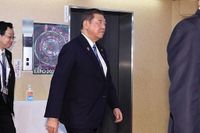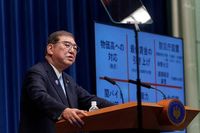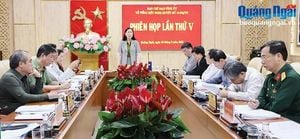Japan is facing a significant economic challenge following the announcement of new tariffs by the United States, which Prime Minister Shigeru Ishiba has labeled a "national crisis." On April 2, 2025, U.S. President Donald Trump revealed that Japan would be subjected to a hefty 24% tariff on goods, a decision that has left the Japanese government scrambling to respond effectively.
In a press conference held on April 3, Ishiba expressed his disappointment over the U.S. decision, stating, "We have made requests [to the U.S. administration] on various levels asking for reconsideration." He emphasized the need for direct dialogue with President Trump, asserting, "If the right thing for me to do is to talk directly with President Trump going forward, then I will ask for an opportunity to do that in the most appropriate way at the most appropriate time." However, despite these efforts, Japan's attempts to negotiate an exemption from the tariffs have been met with frustration.
Economy, Trade and Industry Minister Yoji Muto had previously traveled to the United States on March 10, 2025, to engage in discussions with U.S. Secretary of Commerce Howard Lutnick and other officials. Following this, on March 27, vice ministers from both the Economy, Trade and Industry Ministry and the Foreign Ministry met with high-ranking U.S. government officials to plead for Japan’s exclusion from the tariffs. Unfortunately, these discussions yielded no positive outcomes, with a senior official from the Economy, Trade and Industry Ministry revealing, "The details of the announcement [on tariffs] were completely different from what we had been told in advance. This is not what we anticipated."
The lack of a favorable response from the U.S. has sparked criticism within Japan, particularly from members of the ruling Liberal Democratic Party (LDP). Sanae Takaichi, a former minister in charge of economic security, criticized Muto for only making one visit to the United States, stating, "The Japanese government should have shown [the United States] that it was serious."
In light of these developments, Ishiba has called for a unified national response to what he describes as a crisis. On April 4, during a session in the Lower House, he declared, "The government will do its utmost to respond to this crisis, involving the entire country." This call for unity indicates a shift in strategy as Japan prepares to confront the economic implications of the tariffs.
In addition to seeking direct negotiations with the U.S., the Japanese government is contemplating various strategies to mitigate the impact of the tariffs. Officials are considering leveraging potential negotiations on reducing or abolishing the tariffs by discussing non-tariff barriers and investments related to liquefied natural gas development in Alaska—an area that aligns with U.S. interests.
Despite these efforts, experts suggest that immediate results may be elusive. A high-ranking government official noted, "Mr. Trump made the decision with solid determination. Avoiding the tariffs was always going to be a tough bid. What matters now is how we’re going to respond after the tariffs are implemented."
The broader implications of these tariffs extend beyond Japan, as they affect global trade dynamics. Trump's announcement of tariffs on goods from nearly every jurisdiction worldwide signifies a shift in U.S. trade policy that could have lasting repercussions. Japan, as one of the world's largest economies, finds itself at a critical juncture, navigating the complexities of international relations and economic strategy.
The Japanese government’s response to these tariffs will be closely monitored, not only for its immediate effects on domestic industries but also for its potential to reshape Japan's trade relationships. As Ishiba noted, the situation requires a comprehensive approach that rallies the nation together to face the challenges ahead. "We must call this a national crisis," he stated, underscoring the urgency of the situation.
As Japan grapples with the fallout from these tariffs, the government is also aware of the potential for long-term economic repercussions. Industries reliant on exports to the U.S. are particularly vulnerable, and the government is expected to implement measures aimed at supporting these sectors. The emphasis on a united front signals a recognition that collective efforts will be necessary to address the economic fallout.
In conclusion, Japan's struggle with the new U.S. tariffs represents a significant moment in its economic history. The government's response, marked by calls for unity and strategic negotiations, will be pivotal in determining how effectively Japan can navigate this crisis. As Prime Minister Ishiba leads the charge, the focus remains on securing a favorable outcome for Japan's economy amid a challenging global landscape.






